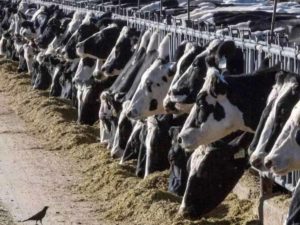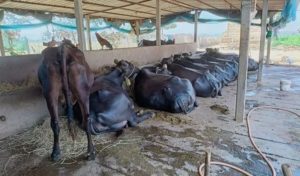Asmall error in the paperwork – a box ticked by mistake – and the tanker of butter oil was held at French customs for five days, with veterinary authorities at the border threatening to destroy it. The debacle nearly cost the tanker’s exporter, dairy company County Milk, a six-figure sum. After fraught negotiations, the cargo was eventually repatriated.
“You don’t need too many of those to be destroyed and you are in dire straits,” says Phil Langslow, trading director at County Milk, the UK’s largest privately owned dairy ingredients business.
While trade from Britain to the EU has begun to recover from the Brexit disruption earlier this year, some sectors are still in trouble, none more so than the dairy industry.
Exports plummeted in February for a second month, HMRC figures showed last week, with milk and cream experiencing the largest post-Brexit loss out of the top 10 foodstuffs sold to the continent.
Analysis of the figures by the Food and Drink Federation (FDF) showed milk and cream exports to the EU fell by 97%, compared with a year earlier, with just £900,000 worth of product exported, compared with more than £24m in February 2020.
Cheese exports for February tumbled from £41m to £14.5m, a slide of 65%, although this was an improvement on the figures recorded in January, when the category collapsed by 85%.
Dairy firms say they face a “killer combination” of increased costs, complexity and paperwork required to export products such as butter, cream and cheese to the EU since Brexit, with some in the industry fearing the current slowdown risks becoming permanent.
Like meat and other products of animal origin, dairy requires some of the most stringent checks, certificates and documentation.
A vet has to inspect the produce and stamp paperwork before it can depart for the continent, while traders have to input details into several databases. If there are any errors in the documents, or a load is rejected by EU customs authorities, delivery can be significantly delayed and, in the worst case, re-exported back to Britain, or even destroyed.
One of the top 10 players in the UK, in a sector dominated by multinationals, County Milk used to export around 15 tankers of cream to the EU each week before Brexit. Since January that has dropped by three-quarters, to three or four tankers.
Trading costs have increased, while transport is often hit by delays, and the uncertainty of delivery means some European customers are offering lower prices for British dairy products.
Langslow said County Milk doesn’t yet know the “true cost of Brexit” for the firm.
“What we are seeing is, it is substantially different and significant enough to just not make it [exporting] viable in a number of cases,” he said.
During the UK’s membership of the EU, dairy trade was a two-way street. British consumers developed a taste for continental cheeses, from French brie and Italian mozzarella to Dutch gouda and Greek feta.
However, European consumers also enjoy British cheddar, while UK-produced cream, butter and cheese are ingredients in many foods manufactured in the EU, including ice-cream and biscuits.
The UK is a net importer, but dairy exports were worth £1.4bn to the UK in 2019, of which the vast majority (86%) went to the EU, while just £246m was exported to the rest of the world, according to HMRC figures.
Not everyone is concerned. Trade body Dairy UK says export data will improve over the coming months. “The normal patterns of trade are resuming as the market smooths itself out, and the national statistics should shortly catch up with the short-term changes,” Dairy UK said.
Others in the industry remain unconvinced.
Andrew Kuyk, director general of the Provision Trade Federation, which speaks for the dairy and pig meat trade, fears the dairy sector’s difficulties are not just teething problems.
“It’s a killer combination of the extra cost and the time and the unpredictability. If you knew it was going to cost you more but it would get there in six hours, eight hours, whatever, you could work round that,” Kuyk said.
“You cannot run a viable business on the basis that four in five loads will get there unscathed. We are talking about an industry where margins are single figures.”
Overseas customers may begin to turn to suppliers in other EU member states, who can guarantee on-time deliveries. If excess supply remains in the UK, it could also drive down prices, impacting farmers at home.
New Markets may open up in the Middle East and Asia, but exporting there may prove just as complex, says Kuyk. “If we are struggling to get it into Calais, how easy is it going to be get it into Beijing, or Tokyo?”










